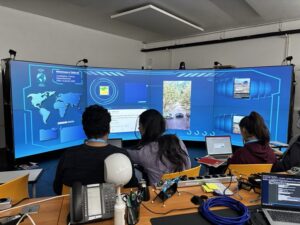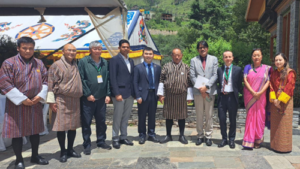Séminaire
How to promote behaviour change towards sustainable climate-friendly and healthy diets? Comparison of different intervention strategies
Lucile Marty, Researcher at INRAE, Centre for Taste and Feeding Behavior (CSGA), Dijon
Cycle de séminaire Climat & Santé organisé par l’Institut de Biologie de l’ENS et le département de Géosciences de l’ENS.
Description
Current food systems, encompassing all activities that relate to production, processing, distribution, preparation and consumption of food, are threatening both population and planet health by being responsible for millions of deaths each year and for a third of global anthropogenic greenhouse gas emissions. In this context, and in line with United Nations Sustainable Development Goals 1 to 4, FAO and WHO have outlined targets for sustainable diets defined as promoting individuals’ health and well-being, having low environmental impact, being accessible to all and culturally acceptable. Specifically, sustainable diets need to include more plant-based ingredients, vegetables, fruits, wholegrains, and pulses and should be limited in red meat, processed meat, salt, added sugar, and high-fat animal products as puts forward by the EAT-Lancet Commission. Millions of lives and a large share of greenhouse gas emissions from Western diets could be saved each year through individual behaviour change towards sustainable diets. However, there is still much debate regarding how this shift can be achieved. What would it take for individuals to shift from their current diet to an alternative diet? How can motivation be enhanced? Are public institutions capable of encouraging this shift?
In this talk I will briefly describe factors influencing food choices and human behaviour models that can be used to develop theory-based interventions and policies to promote healthier and more sustainable diets. I will then present three examples of behavioural intervention research I have been conducting in the past few years.
Free sandwiches will be served after the talk !
Informations supplémentaires
About the seminar cycle – Approaches and methods to quantify links between climate change and health
(see the poster here: https://hub.bio.ens.psl.eu/index.php/s/sYgLyB4ZxYirtgy)
Climate change will have major impacts on human health, and already started to do so. Documenting these impacts, but also the implications that adaptation and mitigation policies may have on human health, is therefore a major issue to feed public decision related to climate change preparedness, adaptation and mitigation.
This short seminar cycles aims at introducing the approaches and methods developed and used at PARSEC (Paris Research on Health, Environment and Climate) in order to foster collaborations with members of other departments and disciplines.
PARSEC is a new research structure dedicated to producing knowledge at the intersection of climate change and health, and supported by the École Normale Supérieure (ENS-PSL) and Inserm (the French National Institute of Health and Medical Research), and directed by Rémy Slama (IBENS).
Les enregistrements de ce cycle seront disponibles sur la chaîne YouTube du département : https://youtu.be/kJR8LJIX_Pg
Lieu
ENS-PSL – 24 rue Lhomond – salle Claude Froidevaux – E314






